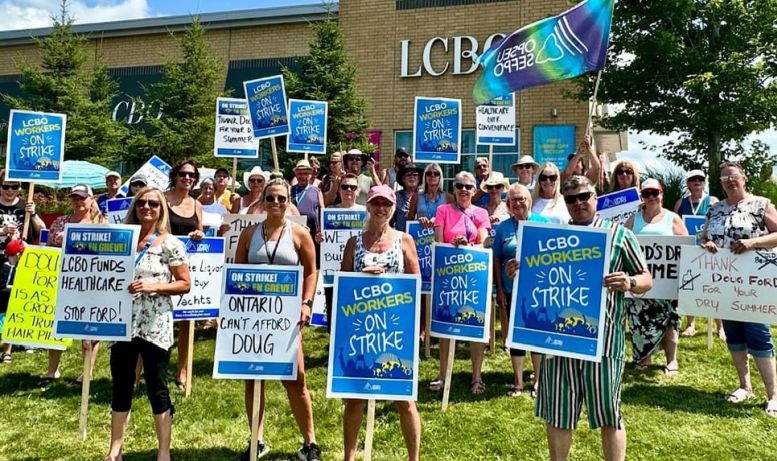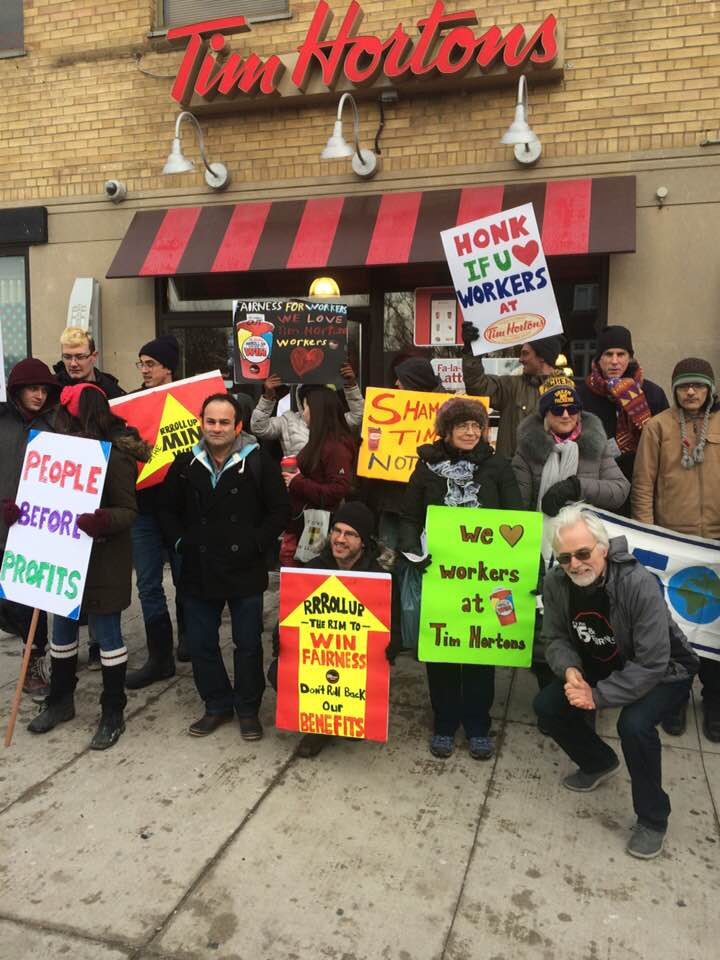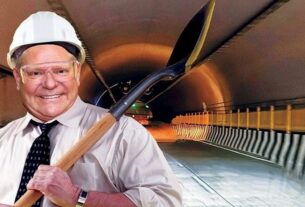LCBO Update, July 24
The strike at the Liquor Control Board of Ontario (LCBO) is over. The workers in the Ontario Public Service Employees Union (OPSEU) ratified the new agreement.
Premier Doug Ford’s odd response to the end of the strike: “We learned many things with this strike — people were still able to get their alcohol … don’t mess around with people’s booze in Ontario, because they aren’t too happy.”
The strike of over 9,000 workers lasted two weeks and closed 680 LCBO outlets. Consumers could still buy alcohol from other retailers, including the 450 grocery stores licensed to sell beer and wine by former Liberal premier Kathleen Wynne in 2015. However, supplies of some items were running low.
Ford’s decision two months ago to spend at least $225 million to allow 8,500 supermarkets, convenience stores and big box outlets to sell booze — and allow the expanded sale of ready-to-drink beverages —spurred LCBO workers to their first strike since its creation in 1927.
A key issue was Ford’s attack on the LCBO’s monopoly on selling cans of premixed drinks. Understandably, the union felt that allowing the convenience stores to sell these drinks would undermine the future of the public retailer. That the sale of pre-mixed drinks accounts for about 9 percent of LCBO sales and almost 62 percent of total Ontario spirits volume sales confirms the union’s fear, which aren’t mitigated by the fact that LCBO will still have exclusive rights to sell regular spirits. During the strike, Ford made it clear that he was not going to budge on this “That ship has sailed,” he said. So, for the workers, conceding this issue was the main negative outcome of the strike.
On other matters, the workers will now receive a modest eight percent pay increase over three years: 3 percent in the first year followed by 2.75 percent and 2.25 percent. It also guarantees no layoffs for the term of the contract due to market changes. The lowest level of the salary grid will be eliminated, boosting the pay of those at the bottom. The LCBO also agreed to limit the number of LCBO agency stores (private stores licenced by the LCBO to sell alcohol, usually in smaller and more remote communities) to 400 for the duration of the three-year contract. There are guarantees that an additional 600 part-time casual jobs will be converted to permanent ones. The deal brings the total of permanent jobs promised to 1,000.
OPSEU president JP Hornick insisted, “this fight is far from over. Ontarians are more aware than ever that Ford’s plan isn’t for them, it’s for big box CEOs. We have no doubt that Ford’s webs of corporate buddies and corrupt backroom deals will continue to be exposed.” Indeed, the fight is not over. Creeping privatization has shown its face in this dispute. The entire labour movement needs to be on guard to ensure that there is no more of it in the future.
Friday July 19
After two weeks of the strike by Ontario’s 9,000 Liquor Board workers the situation is confused. Early on Friday, July 19 it was announced that a tentative agreement had been reached. Then later in the day the strike was still on as the union and employer disagreed.
Central to the dispute is the Ford government’s drive to turn liquor sales over to the big supermarkets, which has many dangers for the workers and Ontario’s public. Recently many workers have rejected inadequate tentative agreements. Unless the public control and regulation of liquor sales is maintained the deal should be rejected.
The strike, the first since the Liquor Control Board (LCBO) was established nearly a hundred years ago, started on July 5 after the workers voted 97 percent for strike action. Clearly, the workers have had enough.
The issues in the strike include job security, hours of work, and defending the LCBO against Ontario premier Doug Ford’s moves to weaken and privatize it. The union, the Ontario Public Service Employees Union (OPSEU), wants to strengthen and expand the role of the LCBO and provide more permanent and full-time jobs.
Some 70 percent of the LCBO workforce are casual employees, with no workplace benefits, and earn a lower wage than their permanently employed colleagues for performing the same job. The average permanent employee earns $31.46 per hour, yet a casual worker’s average wage is just $22.59. Some workers earn as little as $17.65, little more than the province’s poverty minimum wage of $16.55. No mechanisms are in place for casual workers to transition to permanent full-time or part-time positions.
Just a couple of days into the strike, Doug Ford boasted in a video that there is no shortage of alternative locations to get what you need while the LCBO stores are closed. Although a teetotaler he appeared with a can of craft beer and his laptop to show you precisely how to search an online map for nearby alcohol sales. To add to the authenticity, the man who swears off eating red meat then proceeds to flip a burger on the BBQ!
At the start of the strike the Ford government said by July 10 five stores would open for wholesale customers and by July 19 thirty-two stores would open for the public. Since then, both these plans have been scrapped as the union strike is solid.
Ford Attacks LCBO
Central to the dispute is Ford’s drive to boost the profits of the supermarkets — as if they are not making enough profits already! He wants to allow liquor, starting with beer, wine, cider and ready mixed cocktails, to be widely sold in supermarkets, convenience stores and even gas stations (great for drunk driving)! The workers rightly see this as a first step towards the privatization of all alcohol sales.
As OPSEU’s bargaining chair, Colleen Macleod said, “We can’t stand by while Doug Ford gives away the LCBO’s revenues to big box and convenience chain CEOs.” It is important to note that the LCBO’s revenue goes to the province to help pay for public services.
The union is counterposing an improved LCBO to Ford’s gift to big business.
“We see two possible futures:
- Ford hands over more of the market to big box grocers and convenience chains like Loblaws and Circle K.
- The cost of buying booze goes up
- CEOs and billionaires like Galen Weston win big while the rest of us lose.
- Less public revenues to fund our public services.
Or
- The LCBO grows with Ontario.
- LCBO retail locations and hours are expanded to meet demand and improve convenience.
- We increase LCBO warehousing and logistics and bring e-commerce capacity in-house.
- Public revenues that pay for health care and education grow too.
- There are more good jobs in communities across Ontario.”
The union wants to keep profitable products like spirits and spirit-based ready-to-drink beverages exclusively in LCBO stores and win more permanent and full-time jobs.
The History of Selling Alcohol in Ontario
The distribution and sale of booze in Ontario is not straightforward. Beer is sold in one place, The Beer Store (TBS), while wine and spirits (and some beer) is sold in another, the LCBO. The Beer Store is privately owned but government regulated. The publicly-owned LCBO was established in 1927. The fact that it is publicly owned had nothing to do with left-wing sentiment but was related to the end of prohibition and the need to make a concession to the still strong temperance movement. The Liquor Control Act, 1927 authorized the LCBO to “control the sale, transportation and delivery” of alcoholic beverages in Ontario.
TBS also started operations in 1927. It is also governed by the Liquor Control Act and is regulated by the LCBO. It was owned from its inception by a consortium of Ontario-based brewers. It currently operates as a unique open retail and wholesale system primarily owned by three brewing companies: Molson, Labatt, and Sleeman, which are, in turn, owned by multinational corporations. TBS was until recently the only retailer permitted to sell beer for off-site consumption. Interestingly, the majority of Ontarians think that The Beer Store is a government-owned monopoly.
TBS operates approximately 450 outlets in Ontario and has an open policy about stocking small and local breweries. The outlets operate on a break-even basis. However, a Globe and Mail article argued the owners benefited from Ontario’s set-up. Because the shipping, invoicing and tracking is consolidated it saves money — how rare to see this argument put forward to for a planned economy. The saving was estimated to be worth $246 million in 2016.
TBS workers are members of the United Food and Commercial Workers union.
Looking to Privatize
Previous Ontario governments, both Liberal and Conservative, have toyed with the idea of privatization and/or deregulation of TBS and LCBO. Back in 2015, the then Liberal Premier Kathleen Wynne said, “The Beer Store has grown into a de-facto monopoly controlled by a small number of companies. When it comes to the sale of beer in Ontario, I’m here to announce that the status quo is over and that the days of monopoly are done.” However, Ontario governments never pursued privatization of the LCBO and deregulation of TSB.
The LCBO produces a lot of money for the government. Currently it raises $2.5 billion for the Ontario government each year, not counting various taxes on alcohol. While Ford, with his usually fantastic claims about money, says the change will not hit the government’s revenue, most others believe it will cost hundreds of millions.
While the immediate attack is on the LCBO, TBS is following closely behind. On April 15, the government announced that beer will soon become available in 450 grocery stores in “urban population centres” across Ontario, roughly equal to the number of existing TBS outlets in the province. The further hit to public finances doesn’t bother Ford.
The government is ending the contract with TBS now, rather than wait until it expires in 2026. The compensation to TBS owners is estimated at between $225million and $1 billion. A Globe and Mail opinion piece stated that $225-million “is roughly $100-million more than the Ontario government will spend to boost nursing enrolment over the next three years. It represents nearly a third of what Ontario spends annually on autism services ($720-million).” So why not wait until 2026 and, in that way, at least avoid the financial penalties mentioned above?
All About Politics
Ford’s moves are about politics and cynical vote getting. The next Ontario general election is tentatively scheduled to be held on June 4, 2026. If voters can walk into a supermarket in early 2026, to find shelves stocked with beer at lower prices than TBS, Ford’s thinking is that a good chunk of these voters will vote for him later in the year.
However, it is not clear that the beer will be cheaper overall. Also, these moves do not fix the many other more important issues that Ontarians face.
Linda McQuaig wrote, “There are a lot of things that can be hard to get in Ontario — a job, a home, an ambulance when you need it. But one thing that’s rarely difficult to get in Ontario is a drink. Given how easy it’s been to purchase alcohol in the province, it’s odd and a little infuriating that Premier Doug Ford is putting great effort — and considerable taxpayer money — into making alcohol even more widely available.”
Behind Ford’s claims about choice, the reality is that his policy makes a lot of sense to Loblaws and other big grocery chains who will be making big bucks from stocking booze on their supermarket shelves. Resisting this creeping privatization is at the heart of the fight being carried out by the LCBO workers.
Jobs, reduced choice, recycling and under-age drinking
Workers in both TBS and the LCBO are unionized and make good arguments for opposing privatization of the LCBO and de-regulation of TBS.
The government’s plan puts good, unionized jobs at risk and will not create equivalent jobs to replace them. It will put workers at risk of assault. TBS and LBCO stores usually have several staff and some security, while convenience stores often have only one person at work.
The government’s plan could also mean higher beer prices for consumers. Alberta privatized its alcohol retail system in the 1990s and now has some of the highest beer prices in Canada. In fact, a 24-pack of beer from a private liquor store in Alberta can cost over $10 more than the same brand at TBS.
Alcohol sales in convenience and big box stores would hurt consumer choice by reducing product selection. Whereas corner stores and big box retailers tend to sell a limited range of the most popular brands, TBS offers 826 different beers to customers and more than 460 Ontario craft brands. The same applies to the products currently offered by the LCBO.
The government’s plan would also put one of the world’s most successful recycling programs at risk. Over the last five years, TBS employees have recovered more than 9.1 billion beer bottles, cans, and other recyclable materials. This has resulted in 94 percent of all bottles and cans sold by The Beer Store being returned and has produced significant energy savings for the province. LCBO stores don’t recycle, but their used bottles and cans are accepted at TBS stores.
Diverting alcohol sales away from TBS and LCBO could make it easier for minors and intoxicated customers to purchase alcohol by allowing inexperienced, for-profit retailers to sell beer. While TBS challenged 1.6 million customers and refused service to more than 18,000 Ontarians in 2021, for-profit corner stores and big box retailers will be less scrupulous in checking the status of their customers as their interest lies in increasing sales.
The future
The status quo for booze sales is unlikely to hold. Anyone who has been to Europe knows that the norm there is to buy beer, wine and spirits in convenience stores and supermarkets. Likewise, for most states in the US. This trend has already come to Ontario and Canada and will inevitably continue. Times change. Now, Ontarians can get high on legal cannabis, visit 389 rural LCBO agency stores, shop for beer and wine at hundreds of supermarkets, or at thousands of local bars or restaurants (for takeout booze), or order online.
But expanding alcohol sales to other retail outlets can happen without dismantling TBS or the LCBO. The LCBO could remain the only place to buy high-alcohol spirits and be the wholesaler/distributor for the province (delivering savings to the brewers as well as the public). It would also retain its present, desirable locations, and even expand and offer improved service.
If TBS was integrated into the same network, with public ownership, it would provide even more efficiencies of scale, while maintaining the wide range of choices currently available in both LCBO and TBS. An even more integrated and efficient service would come if the big brewers were to be nationalized. The public service model of booze sales might owe its origins to the temperance movement of the 1920s but, 90 years after the end of Prohibition, that is no longer the rationale for continued public ownership. We should make sure that the roles of LCBO and TBS are retained and expanded, not to control the drinking habits of the working class, but to offer good, affordable and widely available products and where the profit motive has been eliminated.
Building a movement against privatization
Conditions in Ontario and across Canada are favourable to the development of a broad-based, working-class-led movement in defence of public services and good-paying, secure jobs. Strikes have erupted across Canada over the past two years, involving education support workers in Ontario, public sector workers in Québec, BC dockworkers, and federal public servants, among others. The LCBO strikers should ally themselves to these and other workers, making an appeal to join them in a common fight against privatization and social spending cuts, for wage increases and an end to casualization. Likewise, the Canadian and provincial federations of labour should take a lead on these issues in terms of organization and coordination. There is every chance of building a great labour-led movement in this way.
Socialist Alternative says:
- Support the contract demands of the LCBO workers
- Maintain and expand the LCBO and TBS as public entities
- For the beer, wine and liquor industry to be nationalized under democratic workers’ control!




